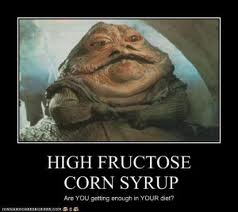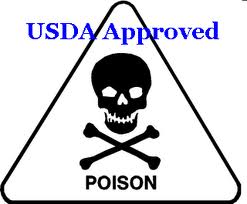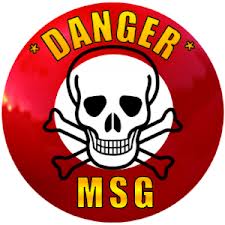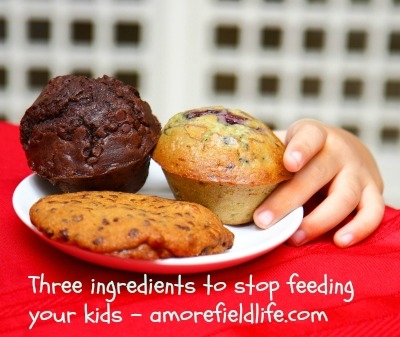No matter how you slice it – choosing the right foods to feed your family is tough! Not only are kids and parents inundated with commercials and peer pressure to eat the baddies everyone knows about, the candy bars, sodas, snack cakes, and candy that kids seem to pick up for ‘free’ at every ‘kid’ activity they go to, but the things that people typically do NOT know about can be just as or even more harmful. While we parents should certainly watch what’s on the front label of the foods our kids eat, it’s also important to pay attention to the ingredient list on the back. A front label might say ‘all natural,’ or ‘packed with vitamins and minerals,’ but that doesn’t mean it isn’t filled with toxic and potentially harmful ingredients. It’s up to us to educate ourselves and vote with our dollars – if enough people do, manufacturers will be forced to listen.
These three ingredients are a great place to start:

1.) High Fructose Corn Syrup
It’s hard to find a processed food without High Fructose Corn Syrup (HFCS), although it’s easier than it used to be. The Corn Growers Association and other special interest groups that have a direct monetary stake in the continuance of turning genetically modified corn into a sweetener that populates seemingly every product on every grocery store aisle are constantly insisting that HFCS is the same as sugar or any other sweetener – except that it’s not. According to Dr. Joseph Mercola (Mercola.com), “Part of what makes HFCS such an unhealthy product is that it is metabolized to fat in your body far more rapidly than any other sugar, and, because most fructose is consumed in liquid form, its negative metabolic effects are significantly magnified.” HFCS has been linked to diabetes, obesity, and metabolic syndrome. Additionally, HFCS is made from genetically modified corn, which brings on a host of other issues.
How to avoid it – Don’t get me wrong – sugar is bad for you, period, and replacing HFCS with regular sugar isn’t the ‘answer’ either, although if you’re going to eat one or the other I would certainly go with organic non-GMO sugar, honey, or stevia as a sweetener over anything with HFCS in it. The best way to avoid HFCS altogether is to check out the labels of everything you buy. If it’s on there, put it back. The good news is, more and more companies are aware of the growing segment of the public that doesn’t want to consume HFCS. Look for more and more boxes and labels that explicitly advertise the absence of HFCS. While it’s best to avoid most processed foods altogether, avoiding HFCS and other dangerous ingredients is certainly a step in the right direction.

2.) Aspartame
Aspartame (NutraSweet, Spoonful, Equal-Measure, and Equal) is 180 times sweeter than sugar. It’s composed of three primary ingredients – phenylalanine (50 percent), aspartic acid (40 percent), and methanol (wood alcohol – 10 percent). Discovered accidentally when a G.D. Searle chemist testing an anti-ulcer drug licked his finger after spilling one of the chemicals he was using, aspartame’s road to FDA approval is more shady than Barak Obama’s birth certificate.
The problem is not so much the amino acids in aspartame, but the ratios and chemical manipulation involved, which causes the body to break them down into free amino acids. Unable to recognize them in that form, it tries to metabolize them anyway, causing the central nervous system to flood and (potentially) causing brain neurons to fire excessively. This condition, called ‘excitotoxicity,’ can cause a whole host of physical and neurological problems. Additionally, the menthol in aspartame, having no natural binder (in nature, menthol is bound to pectin), turns into cancer-causing formaldehyde in the body.
There is so much more to the aspartame story – one that is well worth researching and reading about yourself. Your health and the health of your children could depend on it!
Sadly, in addition to the packet sweeteners at most restaurant tables, aspartame is in so many products, from chewing gum (we had to give up most of our favorite gums – turns out that uncanny ‘long-lasting’ flavor comes with a price!) to yogurts, dessert mixes, gelatins, and lots of ‘sugar-free’ desserts. As always, it’s important to check the labels.

3.) Monosodium Glutamate
Monosodium glutamate (MSG), another excitotoxin added by the ‘big-food’ manufacturers as a ‘flavor-enhancer’ designed to mask the lack of ‘real’ ingredients in processed food, has been linked to brain damage, migraines, ADD, ADHD, obesity, and other health issues. MSG is well known for its prevalence in Chinese food, but it’s also found in certain processed soups, snack foods, and even infant formula and baby food! MSG can be tough to avoid because the ingredient labels aren’t always clear. Here’s a great resource to help educate parents on the ‘why’ and the ‘how’ to avoid MSG.
Those are three great first steps on the road to better nutrition. At first it can be discouraging to find these ingredients in so many things you once purchased regularly, but the effort to avoid them is well worth it. It’s one thing to make our kids ‘eat their veggies,’ but that’s only part of the picture. If they are also eating a load of potentially harmful empty-calories, their little bodies are going to be so busy reversing the effects of a system overloaded with garbage that they won’t be as effective at fighting off disease. No wonder kids, especially during Fall and Winter, seem to be constantly finishing or starting runs of antibiotics! As the ancient Greek physician Hippocrates once said, “Let food be thy medicine and medicine be thy food.” Feed your kids well, and they’ll stay well more often!
If you enjoy our posts, please consider visiting and helping us grow our Facebook page!








Scott, I was reading about MSG on Food Renegade’s Blog the other day (link found here: http://www.foodrenegade.com/msg-dangerous-science/ ) but I was completely overwhelmed when I looked at the list of ingredients that have MSG hidden in them (found here : http://www.truthinlabeling.org/hiddensources.html ) Seems the only way to avoid MSG is to avoid everything purchased in a grocery store, INCLUDING my organic, hormone-free milk as it states than anything “ultra pastuerized” contains MSG. What’s a person to do??
Jessica
Hey Jessica – good links, thanks! Yes, although the organic ultra-pasteurized milk is definitely better than non-organic, it has its problems too. We buy the organic regular-pasteurized milk from EarthFare for about $5.50/gal or so. Raw milk would be ideal but at this time isn’t available to us. THe milk we get is still pasteurized, but apparently doesn’t get radiated like the ultra-pastuerized (hence doesn’t have as far off an expiration date). If it’s USDA organic (green label), my understanding is it’s now allowed to contain MSG. If it does, it’s certainly less than conventional. The goal isn’t to eliminate every toxin (sadly, impossible!), but to limit intake as much as possible so the body isn’t overwhelmed. But you are right, this stuff is everywhere!!